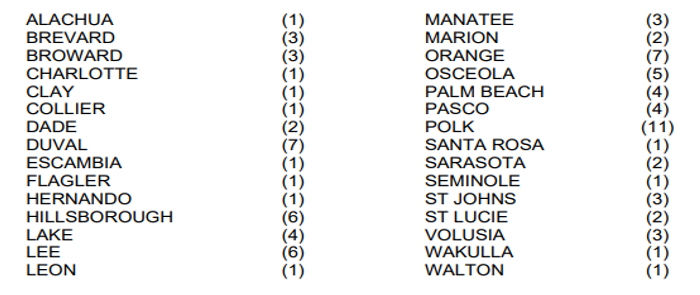2023 Florida Alcoholic Beverage Quota License Drawing Opens
The Florida Division of Alcoholic Beverages and Tobacco will accept quota beverage license drawing entries for 45 days starting on Aug. 21, 2023.
This year, there are 89 licenses available in 30 counties:

Interested individuals and business entities can submit one entry per person or entity, per available county, and each entry requires a nonrefundable fee of $100. The winners will have the right to apply for a quota license and, depending on the county, a license may be sold for $75,000 to $500,000.
What Is a Quota License?
Broadly speaking, a quota license allows the holder to sell all three types of alcoholic beverages (beer, wine and liquor) for consumption on or off the premises.
Every year, the State of Florida holds a drawing to award new quota licenses. The number of licenses available in every county depends on the population increase in each county. Section 561.20(1), Florida Statutes, makes available one license for each population increase of 7,500 residents per county.
Entry and Results
To enter the annual lottery, one must submit a Quota Beverage License Drawing Entry Form during the entry period and pay the $100 nonrefundable fee. The drawing is a double-blind procedure, and the winners are usually announced several months after the entry period closes. Once announced, quota lottery winners must either file an application for the issuance of the license within 45 days or waive the right to apply. There are several state-imposed requirements that must be met, including payment of the required fees.
Holland & Knight Can Help
Holland & Knight attorneys and professionals are available to assist in navigating the process of participating in the quota drawing, securing a license for alcoholic beverages or tobacco products, and protecting the license in case of administrative actions initiated by the Division of Alcoholic Beverages and Tobacco. For more information, please contact the author or a member of the firm's Alcohol Beverage Team.
Information contained in this alert is for the general education and knowledge of our readers. It is not designed to be, and should not be used as, the sole source of information when analyzing and resolving a legal problem, and it should not be substituted for legal advice, which relies on a specific factual analysis. Moreover, the laws of each jurisdiction are different and are constantly changing. This information is not intended to create, and receipt of it does not constitute, an attorney-client relationship. If you have specific questions regarding a particular fact situation, we urge you to consult the authors of this publication, your Holland & Knight representative or other competent legal counsel.
